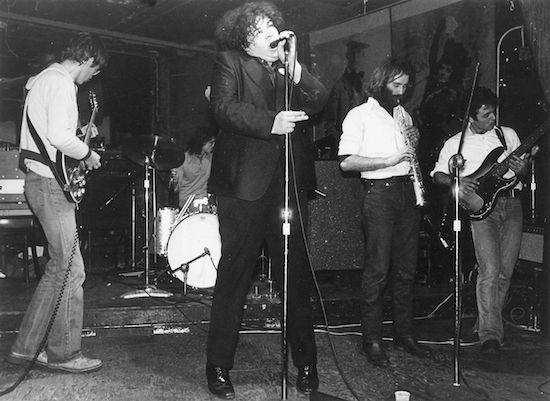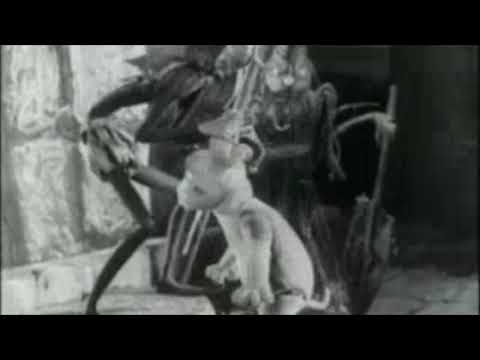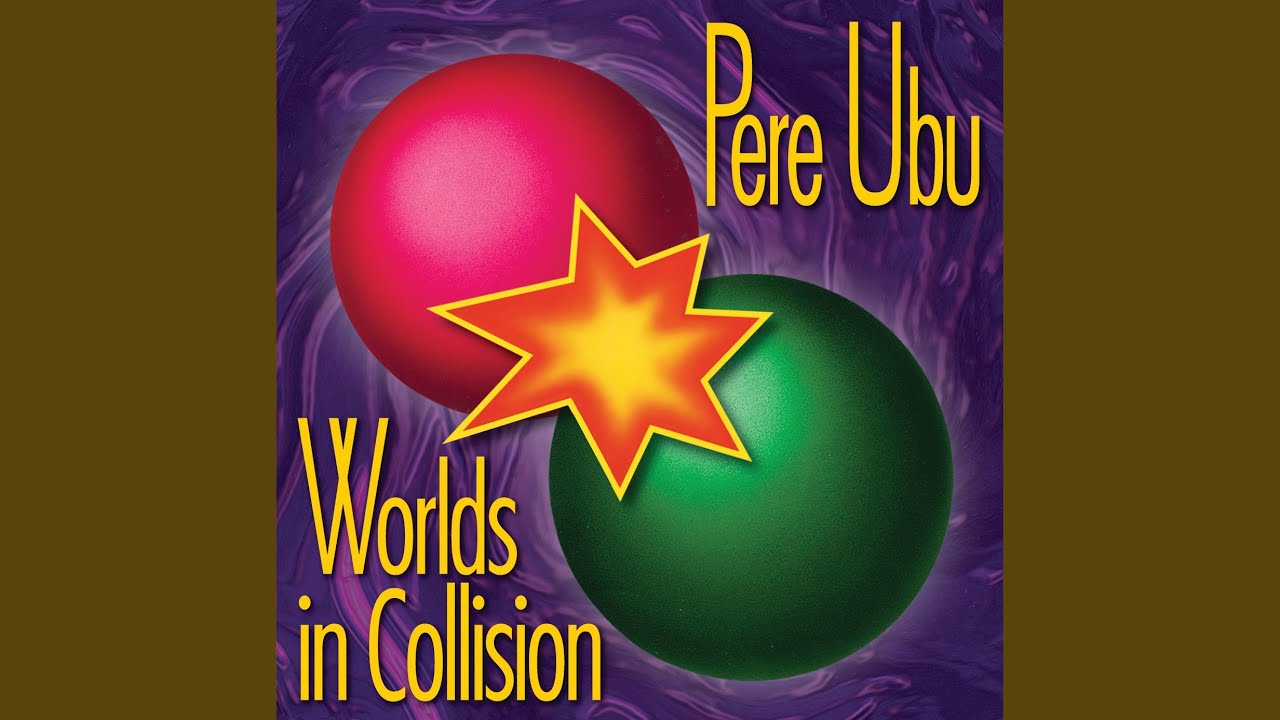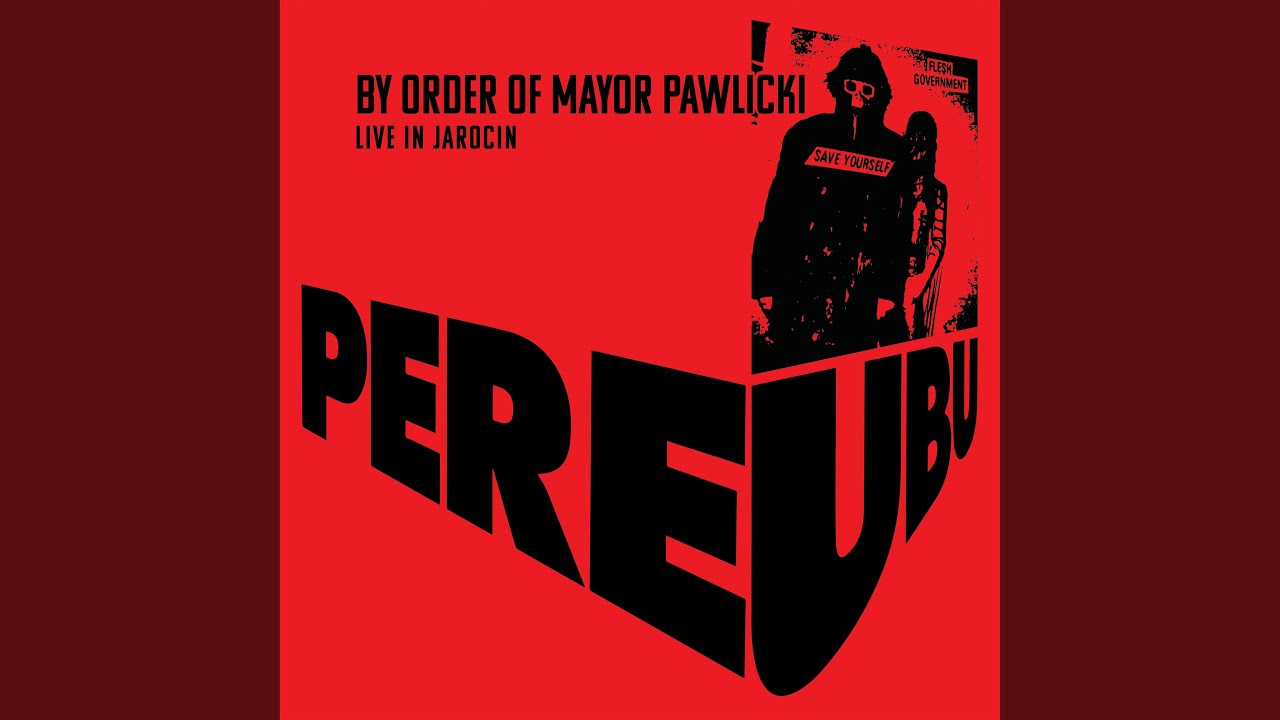Pere Ubu live at CBGB 1978
I’ve been a Pere Ubu fan for over 30 years, having first been intrigued by their ‘comeback’ album The Tenement Year. I’ve written about Ubu more than any other band, and have seen them play live more than anyone else, with the exception of Cardiacs and the Sun Ra Arkestra.
More than three decades is a long time to stick with a band. Such devotion requires either a certain degree of nostalgic self-delusion on the part of the fan, or a band whose original material only grows more singular with age, and whose more recent recordings manage to walk the fine line between self-reinvention and distillation of original essence.
From their first single in 1975, viewed by many as a ‘ground zero’ event for American post punk, through the groove rock meets musique concrète of The Modern Dance, the wild, expressionist rock & roll of Dub Housing, a brief overtly pop phase, experiments in improvised soundtracks for classic B-Movies and more recent electronically dense works, Pere Ubu have consistently evolved their sound, while continuing to exist alone in a genre of their own devising – playfully dubbed the ‘avant garage’. For the uninitiated, they are the science-fiction Stooges, an alternative reality radiation-mutated Talking Heads playing the folk music of the open American interstate highways and post-industrial wastelands.
Utilising electronics in a manner more akin to Faust or Hawkwind than earlier psychedelic forebears like Fifty Foot Hose or The United States Of America, but with a grittier, urban aesthetic, and a singer with an utterly unclassifiable voice, Ubu are unmistakably themselves an no one else. David Thomas was described by writer and comedian, Emerson Dameron, as having a voice like “James Stewart trapped in an oboe” and by Greil Marcus as being the voice “of a man muttering in a crowd. You think he’s talking to himself until you realise he’s talking to you”, Thomas remains the only original member linking the current band to its earliest incarnation.
The 67-year-old Thomas’ expressionistic, often high-pitched voice is perhaps the most marmite of all vocals. For those who value uniqueness, range of expression, and the use of human voice as an instrument with all its inherent capabilities of imparting texture, however, then it’s a set of pipes like no other.
A captivating and unique performer, Thomas’ vision has been the band’s main propelling force for decades. He has also produced a plethora of solo and offshoot recordings, whose grand sense of literary and dramatic ambition reached a collaborative peak with 1999s ‘rogue opera’, Mirror Man, by The Pale Orchestra.
Currently ensconced indoors and maintaining a strict Covid-19 lockdown due to ongoing health issues, Thomas has over the past few months been presenting ‘DPK (Datapanik) TV’ from his studio and home. Shows have seen interviews with The Pop Group, whom Ubu toured with in 1978, and specials centred on particular albums, such as the recent one on The Tenement Year. The second part of that show saw ex-Ubu bassist, Tony Maimone, assemble a band in New York to play a version of ‘The Postman Drove A Caddy’ from that album. The channel offers a magazine style format, presenting approximately three hours of content a month, including new and archive material, (including some videos that I’ve used here), all hosted by David Thomas.
In compiling this list, I’ve tried to avoid repeating myself from previous articles, and have deliberately sought to represent some of David Thomas’ work outside of Ubu, so as to offer a different perspective from the many other Pere Ubu primers out there. Where available, the albums I have referred to are the excellent remastered editions released by Fire Records.
’30 Seconds Over Tokyo’, (1975)
Arising out of the ashes of earlier group, Rocket From The Tombs, Pere Ubu’s debut single is a singular blast of alienated intent that predated the UK post punk scene by several years. It has often been remarked that the US did post punk before punk, and certainly Pere Ubu were staking out similar territory to Joy Division, Wire, Magazine and PiL, two to three years before their sonic visions saw the light of day. Taking its title from Joseph Conrad’s novel of the same name, B-side ‘Heart Of Darkness’ still seems today like the perfect expression of the act of realising the depth of the abyss. William Burroughs’ Naked Lunch, was said to capture the “frozen moment when everyone sees what’s at the end of every fork”. Likewise, b-side ‘Heart Of Darkness’ distils urban existential terror into its absolute essence: “Maybe I’m nothing but a shadow on the wall / Maybe love’s a tomb where you dance at night / Maybe sanctuary is an electric light”. Set to a powerfully metronomic beat that that evokes the hypnotic chug of a locomotive train, and one of the greatest bass lines ever committed to vinyl (laid down by Tim Wright, who not long after left the band and moved to New York, where he would form the seminal No Wave band DNA with Arto Lindsay), the track seems like an oddly prescient blueprint for the sound that Joy Division would develop so brilliantly some years later. Whether Joy Division were influenced directly by this track, or whether they were simply translating their own post-industrial wasteland into similarly propulsive and estranged sounds, both bands were clearly mining similarly precious materials that would weather the passing of time extremely well.
‘(Pa) Ubu Dance Party’ from Dub Housing, (1978)
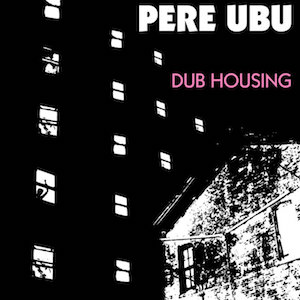
As brilliant as Ubu’s debut, The Modern Dance, is, it’s their second record, released ten months later that is their true masterpiece. On paper at least, the definition of Pere Ubu as a garage rock band with musique concrète elements, makes them sound potentially similar to Cologne-based experimentalists Can. Ubu’s own take on ‘avant-garage’ is harsher however, almost industrial in places, and combines with an absurdist theatricality well suited to a band who took their name from a character in Alfred Jarry’s modernist play Ubu Roi. Often cited as an early precursor to surrealism, Ubu Roi caused a riot when it opened (and closed) in Paris on December 10, 1896. Ubu’s theatricality is closer to Beckett’s use of tableau vivant, or ‘living picture’, such as in his play Endgame, where characters Nagg and Nell live inside dustbins, or Waiting For Godot, where Vladimir and Estragon speculate about the arrival of a mysterious figure who never materialises. On the surface, both of these situations appear to be bizarre and almost devoid of meaning. Yet they can also be interpreted as profound distillations of ideas that carry an enormous weight of meaning, if for instance ‘Godot’ is perceived to be the god-like figure that many believe him to be. It’s exactly this kind of purposeful blurring of meaning and meaninglessness, of the abstract and the concrete, that Ubu accomplish so masterfully on Dub Housing. If Captain Beefheart’s Troutmask Replica can be regarded as “the ur-text of experimental rock music”, Dub Housing similarly contains the blueprint for an industrialised, electronically textured post punk, whose dark imaginative edge was never really surpassed and rarely ever equalled. The album works best as a piece listened through from start to finish, yet each track is also a perfectly contained world. It’s like looking into a series of different funhouse mirrors, through uniquely tinted spectacles of varied hues and seeing fluctuating scenes from different lives, like the casement silhouettes that adorn the album’s cover. Crucially, it also rocks, swings, bounces wildly like a spring, shreds and even goes to a dance party.
‘The Vulgar Boatman Bird’ from Song Of The Bailing Man, (1982)
Red Krayola guitarist and mainstay Mayo Thompson joined Ubu for The Art Of Walking (1980). Thomas and Thompson had already worked together on the 1979 Red Crayola album Soldier Talk, but this is by far the best example of their collaboration and also one of the best albums Thompson ever appeared on. Allegedly Thompson was recruited when Thomas and Ubu’s original synthesizer player Allen Ravenstine were watching a Talking Heads show. Thomas turned to Ravenstine and said: “We were better than these guys.” Ravenstine turned to Thomas and said: “Mayo Thompson”, so they gave him a call and invited him to join the band. For the most part The Art Of Walking is an exercise in making abstract music that is more notable for its attempt to push the envelope, rather than for its memorable songs. Song Of The Bailing Man is a far more consistent and enjoyable affair that invites multiple listens and doesn’t have an under par track on it. You could almost call it Pere Ubu’s ‘jazz album’. On ‘The Vulgar Boatman Bird’, Ravenstine’s synth emulates the sound of chirping cicadas, Tony Maimone’s repetitive bass figure recalls Can’s Holger Czukay on a track such as ‘Mother Sky’, whilst Thomas does his best ‘Ethel Merman on gas’ routine. Thompson’s guitar part and Anton Fier’s rolling drums slot together <a href=""https://www.youtube.com/watch?v=4Jt3k5-NDk8"" target="out">in a seemingly effortless manner. On the strength of this material, it’s a shame that this was the only album this line up recorded. Clearly the presence of Fier (the first Feelies album, Golden Palominos etc) added something essential and rather special to the mix but apparently his perfectionism and Mayo Thompson’s freewheeling attitude did not sit well together on tour, and the band broke up shortly afterwards.
David Thomas And The Wooden Birds – ‘Monster Walks The Winter Lake’ from Monster Walks The Winter Lake, (1986)
For his fourth record under his own name, David Thomas added Daved Hild (of the Boston-based experimental punk band, The Girls, whose brilliant single ‘The Elephant Man’ was released in 1979 on Thomas’ own Hearthan label) on percussion and accordion, and cellist Garo Yellin (of New York experimental big band, The Ordinaires) to the solid Ubu-of-old nucleus of Tony Maimone and Allen Ravenstine. A song cycle of reminiscences and contemplations on life, delivered from the point of view of an unnamed and only partially glimpsed monster, this record is one of the more ‘challenging’ on this list. The title song perfectly evokes a specific aspect of Thomas’ dramatic stage persona that would develop over the coming years with his “folk music from the future” Two Pale Boys trio. Starkly accentuated by accordion, cello and EML synth, Thomas’ unique voice laments: “The monster stands at the edge of the winter lake/ It looks out of the kingdom of the land of the silence/ Stretching out between us”. A swelling melancholy passage follows a chaotic waltz of strings and synth, imparting a deeply human sense of sadness to the otherwise monstrous protagonist. When Thomas and Two Pale Boys took over from the Tiger Lillies in the London production of Shockheaded Peter in 2002, it was no surprise to his fans that he fitted so well into the role of the monster beneath the floorboards, clad in his trademark red butcher’s apron – he had already made the part of the monster his own, some 16 years earlier.
‘Goodnite Irene’ from Worlds In Collision, (1991)
Produced by Gil Norton, already known at that point for his work with Echo & The Bunnymen on Ocean Rain, and with the Pixies on Doolittle, Worlds In Collision was the second of three Ubu albums that aimed for an overtly pop rock sound. Allen Ravenstine had been replaced on synthesiser by Captain Beefheart and Snakefinger associate, Eric Drew Feldman. Although Ubu’s attempt to add a more commercial sheen to their sound is sometimes derided by fans of their more experimental recordings, David Thomas’ pop sensibility – his love of the Beach Boys and Van Dyke Parks for example – has always been audible. Also, any suggestions that Ubu were simply swallowed up into the homogeneity of American indie music of the day conveniently forgets that Ubu themselves were one of the primary influences on that scene, and certainly for bands like the Pixies, with whom Ubu toured. If evidence is required that Pere Ubu can do pop as well as anyone else, ‘Goodnite Irene’ with its sci-fi informed lyrics and James Bond theme-like descending guitar refrain from a particularly on form Jim Jones, represents a compelling argument for the prosecution.
‘Electricity’ from Raygun Suitcase, (1995)
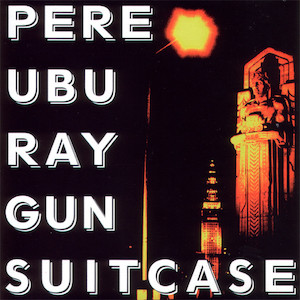
Released from their contract with Fontana, David Thomas and guitarist Jim Jones were joined by Robert Wheeler on EML synthesisers and theremin, Michele Temple on bass and Scott Benedict on drums. Allen Ravenstine was no easy act to follow, but Wheeler – a direct descendant of Thomas Edison who was involved with the Edison Birthplace Museum in Milan, Ohio – was a brilliant choice. Both he and Temple, along with drummer Steve Mehlman, became mainstays for the band in the two decades that followed. David Thomas took over production duties, resulting in a brilliantly cohesive record so full of good material that it’s hard to definitively pick a standout track. A pulsing bass line drives ‘Electricity’ along, recalling the train-like chug of ‘Heart Of Darkness’ but at a slower, yet still equally hypnotic, clip. Thomas evokes an epic timescale with a hint of the post-apocalyptic, with the words: “Cities are stones/ People aren’t important/ People breed and die/ They come and they go… Stones talk like our fathers talk/ Languages of hope & fear/ That we don’t understand/ Like poetry”. Wheeler’s theremin paradoxically adds a human touch, rising skyward like tremulous whistling over the proceedings down below.
The Pale Orchestra – ‘Ballad of Florida’ from Mirror Man, v.1, (1998)
Although the four albums recorded under the David Thomas And Two Pale Boys name have much to recommend them, it was with the much expanded Pale Orchestra line-up that Thomas revealed the huge scope of his ambition and the peerless talent of his musical associates. With the likes of Linda Thompson, Robert Kidney (of cult American blues rock phenomenon The Numbers Band a.k.a. 15-60-75), Jackie Leven, Peter Hammill, Chris Cutler, Van Dyke Parks, the Pixies’ Frank Black and Georgia Hubley, all participating in the project at one time or another, this was a musical vision that took the ingredients of Thomas’ other work and transmuted them into a form of American contemporary opera akin to the work of Robert Ashley. Two Pale Boys often took existing Ubu and David Thomas songs as their starting point, and recast them in a different light, and The Pale Orchestra took this process to a logical conclusion, joining up the dots between his most persistent themes. This evokes the exhilaration of the open highway and the resounding sense of loss that can result from the discontinuity between the persistent memory of a place and the reality of arriving back there. Over a laidback accompaniment of guitar and trumpet, Daved Hild laments: “It used to be gators and swamps and begging Seminole Indians… I was walking around and I was thinking, kind of like those pigs in the A-bomb sites in Nevada, they used to put sunglasses on and wrap them in foil. I wonder what those pigs were thinking, maybe they thought, ‘This is it, I’m on vacation’, then suddenly they’re vaporised”.
‘Drive’ from Pennsylvania, (1998)

Marking the return of original guitarist Tom Herman after a 20-year absence, and with Jim Jones also still in attendance, Pennsylvania saw David Thomas looking back at his hometown from self-imposed exile in the UK and mourning what had been lost through the homogenising effect of corporate consumer culture. A sense of being ultimately off course on the open highway pervades the album, and with no sure destination in sight the existence of the road itself becomes the reason for travelling. No doubt the experience of constant touring plays into this feeling, as on the propulsive ‘Drive’. Metronomic drumming and a Germanic sounding keyboard artfully evokes the sensation of the endless procession of the highway as viewed from the back of a touring van.
‘Road To Utah’ from Carnival Of Souls, (2014)
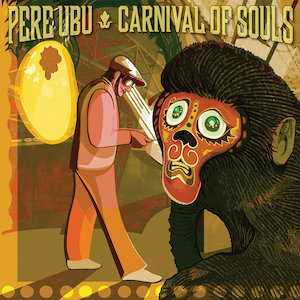
One of the more intriguing variations on Pere Ubu’s live show that has developed over the years, has been their performance of live soundtracks to classic B-movies such as It Came From Outer Space and Roger Corman’s fantastic X: The Man With The X-Ray Eyes. Pere Ubu have always had a hint of the science-fiction B-movie about them, and Thomas has often spoken of the influence of Ghoulardi – a late night hipster horror-host character played by Ernie Anderson, the father of film director PT Anderson. All of which made it an obvious but still inspired move when Ubu started performing soundtracks. Herk Hervey’s 1962 low-budget horror flick, Carnival Of Souls is a wonderfully creepy movie with a Twilight Zone vibe and a strong driving theme, making it perfect material for Ubu. Thomas considered the sound of the album to be like a mixture of Suicide and Kraftwerk. The eerie tone of the film is beautifully evoked with the mixture of electronics from Robert Wheeler but also Gagarin (Graham ‘Dids’ Dowdall) and clarinet from relative newcomer to the band, Darryl Boon. The accompanying video to ‘Road To Utah’ matches the music to scenes from Herk’s film, the track’s darkly propulsive quality perfectly expressing the isolation and terror of protagonist Mary Henry (Candace Hilligloss) as she drifts alone/not alone at the wheel of her car, along spectral pre-dawn highways.
‘Real World’ from By Order Of Mayor Pawlicki (Live In Jarocin), (2020)
Pere Ubu’s ability to consistently put on a great live show, and also to continually refresh the band line-up and setlists, has played a very large part in maintaining my interest over the years. This recent release, looks back at their earlier material, mostly taken from a July 2017 show in Jarocin, Poland. Original guitarist Tom Herman had returned, on the condition that the band tour some of their earlier material. The results were electrifying, with Robert Wheeler on particularly powerful form, unleashing ferocious cascades of babbling analogue synth, like the chatter of angry alien insects. For the Jarocin recording, Herman was replaced by the enormously talented Gary Siperko on a recording that sounds, if anything, more menacing and edgy than the gig I attended on the same tour at The Dome, Tufnell Park, London. At the start of ‘Real World’, from The Modern Dance Thomas asks a rhetorical question: “How can you tell when you’re out in the real world? I’ll tell you how. The real world is funky. It smells funky.” This record is like that. It whiffs of the raw energy of seat-of-the-pants live sonic alchemy, of persisting against the odds, of coping with failing equipment and disinterested sound technicians.
Thanks to Pere Ubu’s manager, Kiersty Boon, for several of the videos used here. Pere Ubu fans can check out DPK TV here

